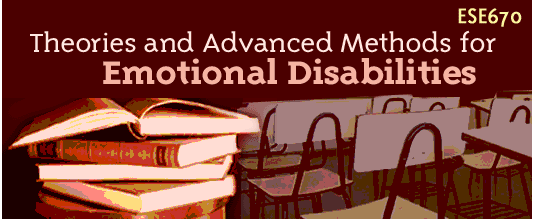
 |
|||||
| |
|
|
|
|
|
Directions: There are three parts to the final. In the first, you will provide short answers to show you have an understanding of the diagnostic content of the class.
In the second part of the exam you will provide examples of methods that would be appropriate to use in supporting students in your care who have emotional and behavioral disorders.
In the third, you will write a brief personal statement about your dedication to youngsters and how you will continue to support and mentor them.
Keep your answers cogent, concise and directed at the required response.
Part One – Short Answer:
Part Two – Methods and interventions: Provide at least two interventions or methods that might work effectively in each category.
Category |
Moderate |
Severe |
Conduct disorder - overt |
|
|
Conduct disorder - covert |
|
|
Delinquency |
|
|
Substance abuse |
|
|
Sexual acting out |
|
|
Anxiety |
|
|
Depression |
|
|
Suicidal ideation |
|
|
Mental retardation |
|
|
Autism spectrum |
|
|
Asperger’s |
|
|
Communication disorder |
|
|
Socialization |
|
|
Mood disorder |
|
|
Schizophrenia |
|
|
Health impairment – ADD |
|
|
HI – ADHD |
|
|
Learning difficulty – reading |
|
|
Learning difficulty – writing |
|
|
Learning difficulty – math |
|
|
Stereotypy |
|
|
Part Three – Personal dedication: Write a brief personal statement about your dedication to youngsters and how you will continue to support and mentor them.